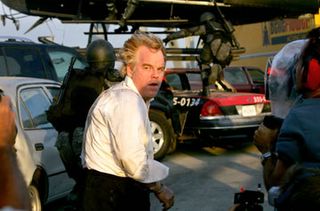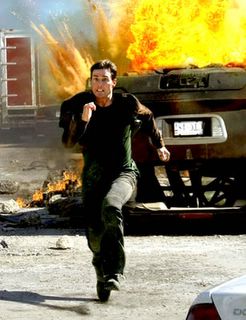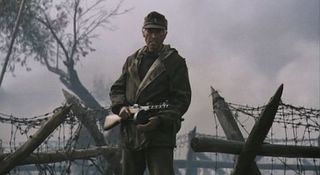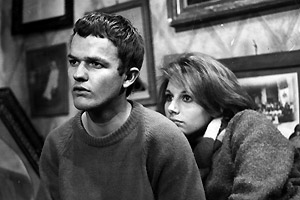Rumor Has It
Now, everyone knows that The Graduate is a fictional movie based on a fictional novel. What this movie presupposes is...what if it wasn't?
Reviewing Rob Reiner comedies post-When Harry Met Sally can prove a delicate endeavor. It goes without saying that the movie is terrible and unfunny. Reiner apparently doesn't get offered quality material any more, because everything he's touched since the mid-90's has been a complete disaster. (And that's if you generously give the nod to the entirely mediocre An American President). To be fair, blame for the banality machine that is last year's Rumor Has It shouldn't be laid solely at Reiner's feet. He took over this troubled production for producer/star Kevin Costner after the screenwriter/director Ted Griffin was fired mid-shoot.
Anyway, the end result couldn't be less amusing. I can't think of a recent comedy that made less of an effort to garner laughs. There aren't really any actual jokes in the entire script. Just a bunch of familiar comic types interacting with straight men and women, discussing the intricacies of the plot and shallow "insights" about the nature of true love.
And what a plot! According to the film, the author of the novel on which the film The Graduate was based lived in Pasadena and based the book on a true story that happened in town. A few days before her planned nupitals, Sarah Huttinger (Jennifer Aniston) discovers that it's her family that formed the basis for the tale. Her grandmother (Shirley MacLaine) was Mrs. Robinson! Her mother, now dead, was played by Katherine Ross in the film! And a shifty young man named Beau Burroughs (Costner) was the model for young Benjamin Braddock. She decides to go see Mr. Burroughs, ostensibly for insight into her own mother's indecision about getting married.
Essentially, Rumor Has It reverses the audience's loyalty from Mike Nichols original film The Graduate. In that movie, we sympathize with Benjamin, whose restlessness relates directly to the common feelings of isolation and angst that in many ways define modern human life. In this movie, we're asked to sympathize with the daughter of Benjamin's old flame. She's Sarah, an attractive, wealthy woman who wants to get married to an nice, attractive man. While The Graduate served as a bold statement for individual identity and personal freedom, Rumor Has It suggests we all just want to seettle down into holy matrimony with someone snuggly in an upper-middle-class suburb.
I'll admit, it's a little bothersome to see such a dense, thoughtful film used as a springboard for such a lame comedy. Rumor Has It not only avoids any kind of artistry such as you would find in The Graduate, it seems to avoid anything that might provide entertainment value. Beau has grown up to be a high-powered, world-traveling, goofy New Age CEO type. I think Costner was trying to make him boyish but overshot and winds up making him a doofus. MacLaine plays the brassy old broad she's played in her last 200 film roles. Richard Jenkins demonstrated more exuberance and life playing a dead man in "Six Feet Under" than here as Sarah's father. (You know, the guy who Katherine Ross ditches at the altar in The Graduate? He's one of the heroes of this movie! Whatever you say!)
The lame Graduate connections wouldn't bother me as much if this film were funny, but as I said, there aren't any jokes to laugh at, even if the mood grabbed you. I'm officially bored with talking about this film now. Here's a related but different topic:
What would be some other good films to "update" in this way? To follow up with 20 or 30 or 40 years later? Here's some I came up with.
Back to Casablanca: Sophie Laszlo arrives in Casablanca on a quest to find out about her moth, who died when she was a little girl babbling about a man named Rick living in Morocco. She meets a local barkeep who seems like he's going to help her, but he refuses to stick his neck out for anyone in this cruel environment of North Africa during the Cold War.
Back to Back to the Future: In the Year 2015, Marty McFly is shocked to discover his younger self wandering around his home on the same day he gets fired via fax. He goes to visit Doc Brown, and the process of discussing this rip in the space-time continuum, they wind up accidentally transplanted into the Age of Explorers.
The Eighth Day in May: Studying attempted military coup carried out in the 60's by Gen. Scott, a similarly crazed general (Jean-Claude Van Damme) plans his own aggressive power grab in 2006. The difference? His coup will all happen on one day...The eighth day in May! And the only one who can stop him is the grandson of Martin "Jiggs" Casey, Captain Casey Ryback, memorably played by Steven Seagal in Under Siege 1 and 2!
The Other Man Who Shot Liberty Valance: We all know Senator Tom Doniphon (John Wayne) confessed to shooting notorious outlaw Liberty Valance. But who fired those other shots, from behind the cactus, back and to the left? That's what the grandson of journalist Ransom Stoddard aims to find out!






